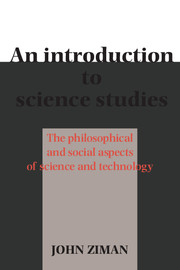Book contents
- Frontmatter
- Contents
- Preface
- 1 ‘Academic’ science
- 2 Research
- 3 Validity
- 4 Communication
- 5 Authority
- 6 Rules and norms
- 7 Change
- 8 The sociology of scientific knowledge
- 9 Science and technology
- 10 Pure and applied science
- 11 Collectivized science
- 12 R & D organizations
- 13 The economics of research
- 14 Science and the State
- 15 The scientist in society
- 16 Science as a cultural resource
- Index
- Frontmatter
- Contents
- Preface
- 1 ‘Academic’ science
- 2 Research
- 3 Validity
- 4 Communication
- 5 Authority
- 6 Rules and norms
- 7 Change
- 8 The sociology of scientific knowledge
- 9 Science and technology
- 10 Pure and applied science
- 11 Collectivized science
- 12 R & D organizations
- 13 The economics of research
- 14 Science and the State
- 15 The scientist in society
- 16 Science as a cultural resource
- Index
Summary
‘To punish me for my contempt for authority, fate made me an authority myself.’
Albert EinsteinRecognition
Scientists make ‘contributions’ to knowledge: what do they get in return? Nowadays most scientists are paid a salary to do research, either on a full-time basis or as a normal part of their academic duties (§10.4). From the point of view of an economist, they are simply professional employees, earning a living by their labour. A psychologist, on the other hand, might emphasize the peculiar personal gratifications of research and discovery, for which there is ample testimony in the autobiographical writings of (mostly successful) scientists. In practice, scientists (like other people) respond to a complex mixture of professional and vocational incentives, which arise from the social environment in which they live and work. Sociologically speaking, academic scientists get both their psychological and material inducements primarily through membership of the community of other scientists. Satisfactory research performance earns recognition within the scientific community, which is usually linked to more obvious rewards from society at large.
Scientific recognition takes a variety of forms, graded to the various stages of a successful career. At the very lowest level, an academic scientist scarcely exists unless his or her work has been published in a reputable scientific journal (§4.4).
- Type
- Chapter
- Information
- An Introduction to Science StudiesThe Philosophical and Social Aspects of Science and Technology, pp. 70 - 80Publisher: Cambridge University PressPrint publication year: 1984



